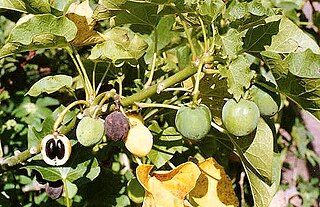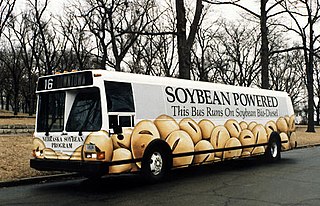Related Research Articles

Palm oil is an edible vegetable oil derived from the mesocarp of the fruit of oil palms. The oil is used in food manufacturing, in beauty products, and as biofuel. Palm oil accounted for about 36% of global oils produced from oil crops in 2014. Palm oils are easier to stabilize and maintain quality of flavor and consistency in ultra-processed foods, so they are frequently favored by food manufacturers. Globally, humans consumed an average of 7.7 kg (17 lb) of palm oil per person in 2015. Demand has also increased for other uses, such as cosmetics and biofuels, encouraging the growth of palm oil plantations in tropical countries.

Biofuel is a fuel that is produced over a short time span from biomass, rather than by the very slow natural processes involved in the formation of fossil fuels such as oil. Biofuel can be produced from plants or from agricultural, domestic or industrial biowaste. Biofuels are mostly used for transportation, but can also be used for heating and electricity. Biofuels are regarded as a renewable energy source. The use of biofuel has been subject to criticism regarding the "food vs fuel" debate, varied assessments of their sustainability, and possible deforestation and biodiversity loss as a result of biofuel production.

Biodiesel is a renewable biofuel, a form of diesel fuel, derived from biological sources like vegetable oils, animal fats, or recycled greases, and consisting of long-chain fatty acid esters. It is typically made from fats.

Neste Oyj is an oil refining and marketing company located in Espoo, Finland. It produces, refines and markets oil products, provides engineering services, and licenses production technologies. Neste has operations in 14 countries.

This article describes the use and availability of biodiesel in various countries around the world.
Neste MY Renewable Diesel is a vegetable oil refining fuel production process commercialized by the Finnish oil and refining company Neste. Whether as an admixture or in its pure form, the fuel is able to supplement or partially replace conventional diesel without problems. Neste guarantees that every gallon sold meets ASTM D975 and EN 15940 specifications in compliance with OEM standards.

Biofuel development in India centres mainly around the cultivation and processing of Jatropha plant seeds, which are very rich in oil, ranging from 27 to 40%, and averaging 34.4%. The drivers for this are historic, functional, economic, environmental, moral and political.
The United States produces mainly biodiesel and ethanol fuel, which uses corn as the main feedstock. The US is the world's largest producer of ethanol, having produced nearly 16 billion gallons in 2017 alone. The United States, together with Brazil accounted for 85 percent of all ethanol production, with total world production of 27.05 billion gallons. Biodiesel is commercially available in most oilseed-producing states. As of 2005, it was somewhat more expensive than fossil diesel, though it is still commonly produced in relatively small quantities, in comparison to petroleum products and ethanol fuel.
Biofuel is fuel that is produced from organic matter (biomass), including plant materials and animal waste. It is considered a renewable source of energy that can assist in reducing carbon emissions. The two main types of biofuel currently being produced in Australia are biodiesel and bioethanol, used as replacements for diesel and petrol (gasoline) respectively. As of 2017 Australia is a relatively small producer of biofuels, accounting for 0.2% of world bioethanol production and 0.1% of world biodiesel production.

Vegetable oils are increasingly used as a substitute for fossil fuels. Vegetable oils are the basis of biodiesel, which can be used like conventional diesel. Some vegetable oil blends are used in unmodified vehicles, but straight vegetable oil often needs specially prepared vehicles which have a method of heating the oil to reduce its viscosity and surface tension, sometimes specially made injector nozzles, increased injection pressure and stronger glow-plugs, in addition to fuel pre-heating is used. Another alternative is vegetable oil refining.

Biodiesel is commercially available in most oilseed-producing states in the United States. As of 2023, it is less expensive than petroleum-diesel, though it is still commonly produced in relatively small quantities.
The biofuel sector in the United Kingdom, under the auspices of the government's Renewable Transport Fuel Obligation (RTFO), has been progressing towards enhanced sustainable energy solutions. Marking a significant stride in this direction was the government's endorsement and introduction of E10 biofuel in late 2021. This fuel blend, consisting of 90% regular unleaded gasoline and 10% ethanol, was introduced as part of an initiative to reduce greenhouse gas emissions (GHG) from transport fuels. The introduction of E10 led to a shift in the renewable fuel landscape in the UK, particularly influencing an increase in the utilization of non-waste feedstocks. In the year 2022, the biofuel sector, as per government reports, achieved a reduction in GHG emissions by 82% in comparison to traditional fossil fuels.
Issues relating to biofuel are social, economic, environmental and technical problems that may arise from biofuel production and use. Social and economic issues include the "food vs fuel" debate and the need to develop responsible policies and economic instruments to ensure sustainable biofuel production. Farming for biofuels feedstock can be detrimental to the environment if not done sustainably. Environmental concerns include deforestation, biodiversity loss and soil erosion as a result of land clearing for biofuels agriculture. While biofuels can contribute to reduction in global carbon emissions, indirect land use change for biofuel production can have the inverse effect. Technical issues include possible modifications necessary to run the engine on biofuel, as well as energy balance and efficiency.

The use of biofuels varies by region. The world leaders in biofuel development and use are Brazil, United States, France, Sweden and Germany.

A low-carbon fuel standard (LCFS) is an emissions trading rule designed to reduce the average carbon intensity of transportation fuels in a given jurisdiction, as compared to conventional petroleum fuels, such as gasoline and diesel. The most common methods for reducing transportation carbon emissions are supplying electricity to electric vehicles, supplying hydrogen fuel to fuel cell vehicles and blending biofuels, such as ethanol, biodiesel, renewable diesel, and renewable natural gas into fossil fuels. The main purpose of a low-carbon fuel standard is to decrease carbon dioxide emissions associated with vehicles powered by various types of internal combustion engines while also considering the entire life cycle, in order to reduce the carbon footprint of transportation.

The indirect land use change impacts of biofuels, also known as ILUC or iLUC, relates to the unintended consequence of releasing more carbon emissions due to land-use changes around the world induced by the expansion of croplands for ethanol or biodiesel production in response to the increased global demand for biofuels.

Palm oil, produced from the oil palm, is a basic source of income for many farmers in South East Asia, Central and West Africa, and Central America. It is locally used as cooking oil, exported for use in much commercial food and personal care products and is converted into biofuel. It produces up to 10 times more oil per unit area than soybeans, rapeseed or sunflowers.
United Metro Energy Corp. is a privately held energy company, founded in 1942 and based in New York. The company supplies biodiesel, heating oil, ultra-low-sulfur diesel, natural gas and gasoline from its terminals in Greenpoint, Brooklyn and Calverton, Long Island.

Global Clean Energy Holdings (OTC:GCEH) is a Southern California-based renewable energy company with interests in the production and commercialization of non-food-based feedstocks used for the production of biofuels, biomass, and renewable chemicals. It was founded in 2007.

Palm oil production is vital for the economy of Malaysia, which is the world's second- largest producer of the commodity after Indonesia. The Malaysian Palm Oil Board (MPOB) is a government agency responsible for the promotion and development of the palm oil sector in the country. The country's palm oil industry produces about 90 million tonnes of lignocellulosic biomass, including empty fruit bunches, oil palm trunks, and oil palm fronds, as well as palm oil mill effluent (POME). In 2010, in response to concerns about social and environmental impact of palm oil, the Malaysian Government pledged to limit palm oil plantation expansion by retaining at least half of the nation's land as forest cover.
References
- ↑ "Archived copy" (PDF). Archived (PDF) from the original on 2015-10-01. Retrieved 2015-09-30.
{{cite web}}: CS1 maint: archived copy as title (link) - ↑ "MALAYSIA: Japan's Yanmar to set up biodiesel R&D hub in Sabah". EnergyAsia. 2007-05-11. Archived from the original on 2015-10-01. Retrieved 2022-02-22.
- ↑ Pakiam, Ranjeetha (6 August 2014). "Malaysia Delays Full Implementation of B5 Biodiesel Mandate". Bloomberg. Archived from the original on 2021-06-09. Retrieved 2022-02-22.
- ↑ "Palm oil biodiesel programme to cover all of Malaysia by July | The Star". Archived from the original on 2015-10-01. Retrieved 2015-09-30.
- ↑ "B10 biodiesel programme to be implemented nationwide starting october". 9 June 2015. Archived from the original on 2015-09-30. Retrieved 2015-09-30.
- ↑ "Malaysia to implement B10 biodiesel mandate by October | The Star". Archived from the original on 2015-10-01. Retrieved 2015-09-30.